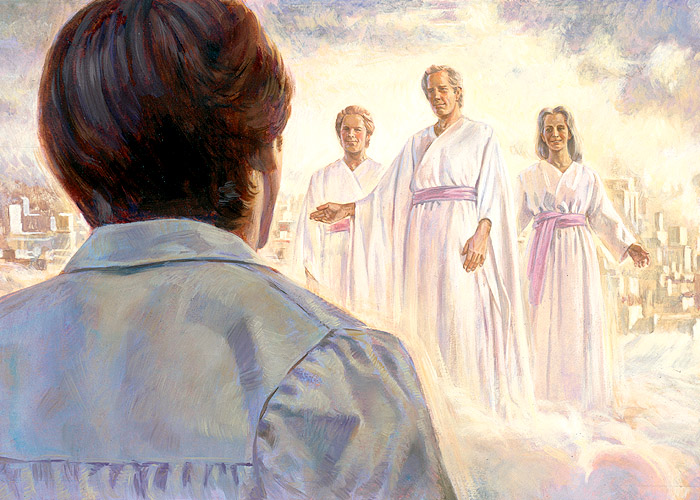Question
Gramps,
Joseph Smith teaches in the King Follet Sermon that the mind/intelligence of man is co-equal [co-eternal] with God. He says that “the intelligence of spirits had no beginning, neither will it have an end…Intelligence is eternal and exists upon a self-existent principle. It is a spirit from age to age, and there is no creation about it.” Abraham touches on this principle as well. But my question is, how can our spirits be eternal and the literal offspring of God?
Brian
Answer
Brian,
In Latter-day Saint theology, spirits are considered the literal offspring of Heavenly Parents. This belief is rooted in scriptural references that affirm the divine parentage of all human beings. The Apostle Paul states, “Furthermore we have had fathers of our flesh which corrected us, and we gave them reverence: shall we not much rather be in subjection unto the Father of spirits, and live?” (Hebrews 12:9). This scripture emphasizes the familial relationship between God and humanity, suggesting that just as earthly parents have children, so too do Heavenly Parents.
The Church teaches that each spirit is born of these exalted parents, which implies a process of spiritual birth rather than mere creation. This understanding is further supported by the doctrine that all spirits existed in a pre-mortal state, where they were nurtured and prepared for their earthly missions. As stated in the Doctrine and Covenants, “Man was also in the beginning with God. Intelligence, or the light of truth, was not created or made, neither indeed can be” (D&C 93:29). This scripture indicates that spirits possess an eternal nature, having existed alongside God before their mortal birth.
A common question arises: do spirits have an age? In the context of Latter-day Saint theology, spirits do not age in the same way that physical bodies do. Instead, they exist in a state of eternal progression. The concept of age is often tied to physical existence and mortality, which does not apply to spirits in their pre-earth state. As Gramps once explained, “We are of the race of the Gods, and as such have the potential to grow to an eternal maturity and become like our Heavenly Parents. This suggests that while spirits may not have a conventional age, they are capable of growth and development in a spiritual sense.
The idea of eternal progression is central to understanding the potential of spirits. Latter-day Saints believe that spirits can continue to grow and develop, ultimately achieving a state of exaltation, which is the highest form of existence in the celestial kingdom. This belief emphasizes the importance of earthly life as a time for learning, growth, and preparation for eternal life.
The question of how spirits are created is intricately linked to the nature of God and the divine process of procreation. Latter-day Saints believe that Heavenly Father and Heavenly Mother engage in a divine process to bring forth spirit children. This belief is articulated in the teachings of the Church, which emphasize that spirits are not merely created ex nihilo (out of nothing) but are born of divine parents.
As Gramps once noted, “Spirit children are born of resurrected, exalted parents. They are born in the same manner that mortal children are born. However, when a celestial parent has a child, it is composed of spiritual material, not physical material.” This distinction highlights the unique nature of spiritual birth, where the essence of the spirit is derived from the divine attributes of its Heavenly Parents.
The teachings of the Church also clarify that Jesus Christ is referred to as the “Only Begotten Son” because He is the only one who was born of the Father in the flesh. In contrast, all other spirits, including humanity, are considered spirit children of God, born in the pre-mortal existence. This understanding reinforces the idea that while Jesus holds a unique position in the divine hierarchy, all humans share a common heritage as children of God.
The belief in pre-earth existence and the divine nature of spirits has profound implications for understanding human potential. Latter-day Saints view each individual as a child of God, endowed with divine potential and the capacity for growth and development. This perspective fosters a sense of purpose and responsibility, encouraging individuals to strive for excellence and to live in accordance with divine principles.
As Gramps once explained, “God is a perfected man, once a mortal, whose eternal spirit was begotten by His own Heavenly Father.” This statement encapsulates the belief that humans can aspire to become like their Heavenly Parents, achieving a state of exaltation through adherence to the teachings of the gospel.
Earthly life is viewed as a critical phase in the eternal progression of spirits. It is during this time that individuals have the opportunity to learn, grow, and make choices that will affect their eternal destiny. The teachings of the Church emphasize the importance of agency, allowing individuals to choose between good and evil, thereby shaping their spiritual journey.
The concept of agency is central to the plan of salvation, which provides a framework for understanding the purpose of life on earth. As individuals navigate the challenges of mortality, they are encouraged to seek guidance from their Heavenly Parents and to rely on the teachings of Jesus Christ to navigate their spiritual path.
The ultimate goal of Latter-day Saints is to achieve exaltation, which is the highest state of existence in the celestial kingdom. This belief is rooted in the understanding that through faith, repentance, and adherence to the principles of the gospel, individuals can return to live in the presence of their Heavenly Parents.
As stated in the Doctrine and Covenants, “They are they who received the testimony of Jesus, and believed on his name and were baptized after the manner of his burial… They are they who are priests and kings, who have received of his fulness, and of his glory” (D&C 76:51-58). This scripture encapsulates the promise of exaltation, emphasizing the importance of living a Christ-centered life and fulfilling divine covenants.
Related articles
Did our spirits in the pre-earth life have an age?
Why do the scriptures say Jesus is the only begotten?
Gramps







